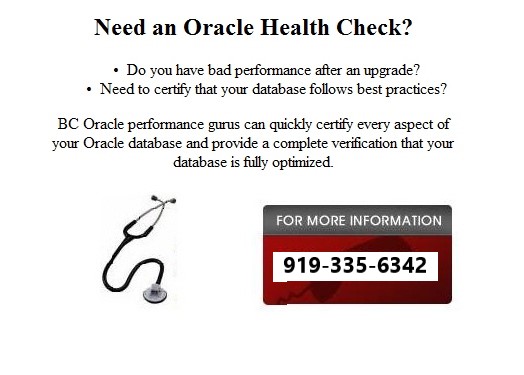Question: I'm trying to issue a "create index" statement in
PL/SQL and I get the error:
DECLARE
c_Count NUMBER;
BEGIN
SELECT COUNT(*) INTO c_Count
FROM DBA_INDEXES
WHERE TABLE_NAME = 'SOME_TABLE_NAME'
AND INDEX_NAME = 'SOME_INDEX_NAME'
AND OWNER = 'SOME_OWNER'
AND TABLE_OWNER = 'SOME_OWNER';
IF c_Count = 0 THEN
CREATE INDEX SOME_OWNER.SOME_INDEX ON SOME_OWNER.SOME_TABLE (SOME_KEY);
END IF;
END;
PLS-00103: Encountered the symbol "CREATE" when expecting one of the
following: begin case declare exit for goto if loop...
Can you
show an example of doing DDL in PL/SQL?
Answer: You can issue DDL for PL/SQL
The
Oracle docs note these examples of issuing DDL in PL/SQL:
Executing DDL Statements in PL/SQL
In PL/SQL, you can only execute the following types of
statements using dynamic SQL, rather than static SQL:
Data definition language (DDL) statements, such as CREATE, DROP,
GRANT, and REVOKE
CREATE OR REPLACE
PROCEDURE salary_raise (raise_percent NUMBER, job VARCHAR2) IS
TYPE loc_array_type IS TABLE OF VARCHAR2(40)
INDEX BY binary_integer;
dml_str VARCHAR2 (200);
loc_array loc_array_type;
BEGIN
-- bulk fetch the list of office locations
SELECT location BULK COLLECT INTO loc_array
FROM offices;
-- for each location, give a raise to employees with the
given 'job'
FOR i IN loc_array.first..loc_array.last LOOP
dml_str := 'UPDATE emp_' || loc_array(i)
|| ' SET sal = sal * (1+(:raise_percent/100))'
|| ' WHERE job = :job_title';
EXECUTE IMMEDIATE dml_str USING raise_percent, job;
END LOOP;
END;
/
SHOW ERRORS;
CREATE OR REPLACE PROCEDURE add_location (loc VARCHAR2) IS
BEGIN
-- insert new location in master table
INSERT INTO offices VALUES (loc);
-- create an employee information table
EXECUTE IMMEDIATE
'CREATE TABLE ' || 'emp_' || loc ||
'(
empno NUMBER(4) NOT NULL,
ename VARCHAR2(10),
job VARCHAR2(9),
sal NUMBER(7,2),
deptno NUMBER(2)
)';
END;
/
SHOW ERRORS;
|

|
